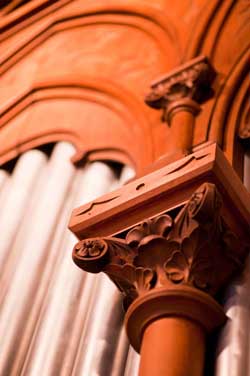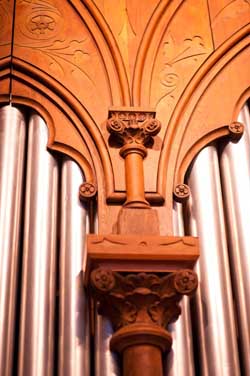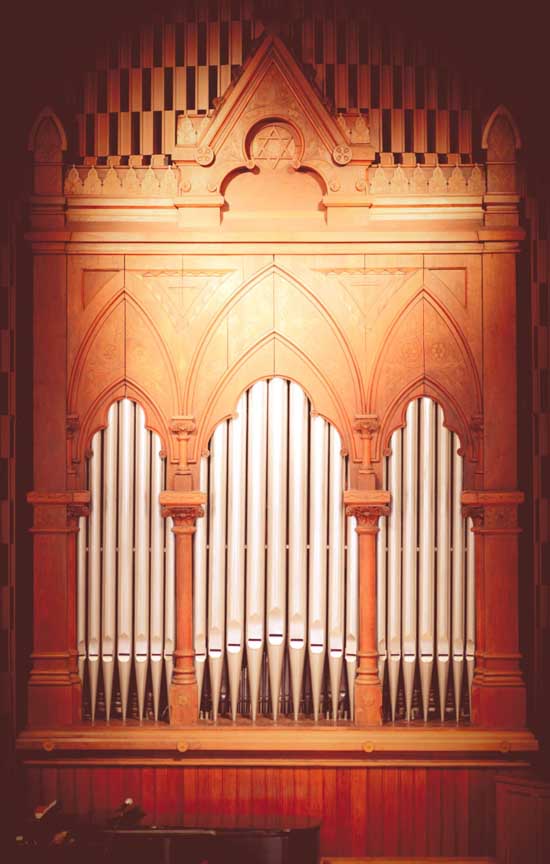Last Sunday we posted Question 107 from Rev. Van Horn’s series on the Westminster Shorter Catechism, and I stated that we would re-run that series, but with some additional content. However, upon reviewing our files here at the PCA Historical Center, I see that we have another bundle of twenty articles by Rev. Van Horn on the doctrines of the Westminster Standards. This was a collection graciously donated a few years ago by the Rev. Vaughn Hathaway, and we’re particularly pleased to have this rather rare set of studies. So for the next twenty Sundays, we’ll be going through this series, and I trust you will find it as profitable as the former series. Today’s message is particularly apt for our times.
“To God’s Glory” : A Practical Study of the Doctrines of the Westminster Standards.
by Rev. Leonard T. Van Horn
THE SUBJECT : The Sovereignty of God.
THE BIBLE VERSES TO READ : Ephesians 1:11; Romans 9:15; 11:36; I Chronicles 29:11; Isaiah 9:6.
REFERENCE TO THE STANDARDS — Westminster Confession of Faith : chapter 2, paragraphs 1 2; chapter 3; chapter 10; Westminster Larger Catechism : Questions 7; 12; and 67; Westminster Shorter Catechism : Questions 4; 7; and 31.
This is the doctrine so basic to all other doctrines in God’s Word. This is the doctrine which is the foundation of our very lives. This is the doctrine meaning His absolute right to govern and dispose of all His creatures, simply according to His own good pleasure.
No matter what unsaved man might say, God has not lost control of this world. He cannot do so because as the Supreme, the Infinite, the Eternal Being He exercises absolute sovereignty over the whole of creation.
The question was once asked me, “How many times during a week do you make use of this doctrine?” How could one count the ways in which it is used? In counseling, in comforting, in teaching, in exhorting, and in preaching, this doctrine is the foundation. This doctrine furnishes the child of God with the ability to live and move and have his being while he completes his sojourn on this earth.
How precious it is to have the kind of God who has absolute dominion and authority! This is the kind of God with whom we want to deal in our salvation. So should it be that He is the kind of God with whom we want to deal in our lives after He has saved us. When we think Who He is we should cry out: “Alleluia – for the Lord God omnipotent reigneth!”
The danger regarding this doctrine is that we will not understand, and practice, an important aspect of it. We must understand that if we are to enjoy the benefits of this doctrine in our lives we must be willing to submit to Him as a Sovereign God. We glorify Him (I Cor. 10:3) when we submit to Him in all things (Rom. 6:13).
John Owens states, “The carnal mind is pleased with nothing of all this, but riseth up in opposition unto every instance of it. It will not bear that the will, wisdom, and pleasure of God should be submitted unto and adored in the paths which it cannot trace.” Though he was speaking primarily of theological matters, his statements are equally true regarding the common problems of God’s children.
A former Professor was fond of saying, when discussing the Sovereignty of God, “What the Bible says, God says, and that ends the matter, period!” There is so much value to this doctrine. We need to be reminded that it :
. . . Deepens our respect for the character of our God for He has “created all things, an for Thy pleasure they are and were created” (Rom. 4:11);
. . . Tells us of the depth of His wisdom (Rom. 11:33)
. . . Teaches us that His will does not change (Acts 15:18);
. . . Destroys the heresy of salvation by works for God helps those who are unable to help themselves (Rom. 9:16);
. . . Works against our human pride and teaches us humility for we know what we are, what we have, is unmerited on our part (Psalm 115:1).
This doctrine becomes real to us, becomes practical to us, when we begin to understand what Arthur Pink meant when he said, “God is infinite in power, and therefore it is impossible to withstand His will or resist the outworking of His decrees.” It is good for us to add one word to Pink’s statement, the word “My” right at the beginnin. “My” God is infinite in power and therefore I will not fear what man will do to me. “My” God is infinite in power therefore what time I am afraid I will trust in Him. “My” God is infinite in power and therefore I will both lay me down in peace and sleep; for Thou, Lord, only makest me dwell in safety. (Ps. 4:8).
This is the same as saying, “The eternal God is thy refuge, and underneath are the everlasting arms.” How we should praise God for this! How it should give to us absolute security! How it should give to us comfort in sorrow! How it should guarantee to us the final triumph of good over evil!
Certainly there are dark hours ahead for all of us. But how glorious it is to know that we will still be in the covenant for He is a Sovereign God whose strong arm is ever encircling us and whose promises are true and will be kept! He states this is His Word. And He proves it repeatedly in the working out of His providence in us.
All this leads us to sing out:
“Now let the feeble all be strong,
And make Jehovah’s power their song;
His shield is spread o’er every saint,
And thus supported, who can faint?”

 At the request of Dr. Robert G. Rayburn, then president of Covenant Theological Seminary, a search was launched for a good, used, tracker action pipe organ of suitable size to be located in the chapel which was about to begin construction. Leads were checked out; a two-manual (keyboard) organ at St. Henry’s Roman Catholic Church in Cincinnati, Ohio became the best prospect. The church’s congregation had dwindled, the organ had stood mute for years, and the Gothic building was slated for demolition. Negotiations for its purchase were quickly completed and generous members of the seminary board gave funds for its purchase, moving and rebuilding.
At the request of Dr. Robert G. Rayburn, then president of Covenant Theological Seminary, a search was launched for a good, used, tracker action pipe organ of suitable size to be located in the chapel which was about to begin construction. Leads were checked out; a two-manual (keyboard) organ at St. Henry’s Roman Catholic Church in Cincinnati, Ohio became the best prospect. The church’s congregation had dwindled, the organ had stood mute for years, and the Gothic building was slated for demolition. Negotiations for its purchase were quickly completed and generous members of the seminary board gave funds for its purchase, moving and rebuilding. The original builder of the organ, Johann H. Koehnken [1819-1901] emigrated from his native Saxony, where he had trained as a cabinetmaker and worked as one for two years, to continue his trade in Wheeling, West Virginia,, for another two years before arriving in Cincinnati in 1839. There he was taught organ building by his employer and fellow German Mathias Schwab, who had come to the United States in 1831. Schwab was the West’s first major organ builder, and he supplied finely wrought instruments over a wide area, including Detroit, Baltimore and St. Louis. Of the hundreds of organs built by Schwab, only two are know to exist in original condition and both are in Kentucky.
The original builder of the organ, Johann H. Koehnken [1819-1901] emigrated from his native Saxony, where he had trained as a cabinetmaker and worked as one for two years, to continue his trade in Wheeling, West Virginia,, for another two years before arriving in Cincinnati in 1839. There he was taught organ building by his employer and fellow German Mathias Schwab, who had come to the United States in 1831. Schwab was the West’s first major organ builder, and he supplied finely wrought instruments over a wide area, including Detroit, Baltimore and St. Louis. Of the hundreds of organs built by Schwab, only two are know to exist in original condition and both are in Kentucky.
 “I perceive that pride is the great enemy of my soul. Often it prevents the enjoyment of God, and enlargement of heart. I must be emptied before I am filled. Alas, that my soul is so foolish and sinful as to indulge in pride. Were I more humble, I should have more communion with God, and more comfort. I think He is humbling me. Blessed be His name, that I, in any measure, see the sin of pride, and the importance of humility, and that I labour in any degree to suppress the rising of pride, and pray with any ardour for humility. I feel my insufficiency for the work of the ministry. But I look to Him, who hath promised:
“I perceive that pride is the great enemy of my soul. Often it prevents the enjoyment of God, and enlargement of heart. I must be emptied before I am filled. Alas, that my soul is so foolish and sinful as to indulge in pride. Were I more humble, I should have more communion with God, and more comfort. I think He is humbling me. Blessed be His name, that I, in any measure, see the sin of pride, and the importance of humility, and that I labour in any degree to suppress the rising of pride, and pray with any ardour for humility. I feel my insufficiency for the work of the ministry. But I look to Him, who hath promised: 
